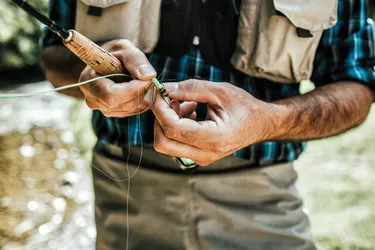
It's a job that weekend fishermen can only dream of: becoming a professional in the world of tournament fishing. Besides doing what they love, tournament fishermen can take home impressive earnings. According to a 2020 article in Field and Stream magazine, lifetime winnings for the top 10 tournament bass fishermen ranged from $2.9 million to $6.8 million.
Professional Tournament Fisherman Description
Video of the Day
Elite series winner Kevin Hawk, writing for Bassmaster, urges prospective tournament fishermen to prepare financially for the pro circuit. As of 2016, Hawk estimated he spent about $70,000 per season on fees and expenses while competing in the elites. Not all will recoup their investments, but as earnings of the top fishermen show, success as a professional tournament fisherman can be quite lucrative.
Video of the Day
Pro fishing tournaments are sponsored by retailers such as Bass Pro Shops and manufacturers of everything from boats to electronics, as well as rods, reels and lures. In addition to monetary earnings from the tournament, winners are paid by sponsors to endorse their products in the same way that a big-name basketball player might endorse a certain brand or model of athletic shoe.
Professional Tournament Fisherman Education Requirements
Becoming a prize-winning tournament fisherman is not something you can learn about in school, so there are no formal education requirements. What matters are your knowledge and skill, which you'll develop over time and with practice.
There's no shortage of fishing publications, including books and magazines, so read all you can. Participate in local tournaments and learn from other fishermen. Some will guard their secrets, but others will be open to sharing their strategies with you. It can help you to make notes after each outing so you can begin to identify patterns and practices that lead to a successful day on the water.
About Tournament Fishing
Overton's, a marine and water sports superstore, explains that tournament fishing is usually geared toward a specific kind of fish, such as bass, walleye or catfish, with the winner being the one with the highest overall weight of fish in their livewell. A livewell is an aerated tank where fish are kept alive so that they can be released after they're weighed at the end of the tournament. The standard limit is five fish; each must measure at least 12 inches.
Tournaments usually begin at 5 or 6 a.m. with a limit of six to 10 hours in which the fish can be caught. Fishermen have accurate weight scales in their boats so that they can continue to cull the smallest fish from the livewell. There is increasing emphasis on fish welfare in tournaments and fishermen can face penalties if the fish in their livewell are not alive and well at the time of weigh-in.
Years of Experience
Although there is always a bit of luck involved, successful tournament fishermen have years of experience. Elite series winner Kevin Hawk stresses the importance of competing first at the club level to gain confidence and build skills. He advises beginning tournament fishermen to work their way up the ranks slowly to get to the big-money tournaments.
Growth Trend for Tournament Fishing
In the past 25 years, tournament fishing has grown in popularity. In addition to state associations, there are national associations such as Major League Fishing, Bassmaster and Fishing League Worldwide. Pro tournaments enjoy coverage in print and on television like never before.
According to PR Newswire, fishing gained a record number of new and returning participants during 2020, a factor largely attributed to the COVID-19 pandemic and attendant restrictions on social distancing. The report on the study by the Recreational Boating and Fishing Foundation noted that new anglers are younger, more diverse and more socially connected. Ninety percent of new fishermen said they planned to stick with the sport even as life returns to normal. That bodes well for the future of the sport and, in turn, the popularity of tournament fishing.